Another year, another quarterly earnings announcement, a mere month before WWDC, and not a hint of an Apple Television. Don’t hold your breath. While many of us may crave the idea of an Apple Television and certainly millions of us are not pleased with our present television “experience,” there is little for Apple to gain by offering such a product. Indeed, Apple could actually be harmed by offering an Apple Television.
This is especially true for Apple’s two largest markets, America and China. In both, smartphones are commanding more of our time, more of our attention, more of our dollars. An Apple Television may do little more than shift our focus (and thus our dollars) away from the iPhone juggernaut. That would be a costly mistake for the company.
Stay On Target
The iPhone generates more than half of Apple’s revenues and profits. While some may insist this is a reason for the company to further diversify, such a sentiment is ignoring two critical facts:
- The total addressable market for the iPhone extends into the billions of units. Nothing else comes close. Nothing. Apple’s primary focus therefore should be on aggressively growing the iPhone user base and maximizing the iPhone ASP, and not on lesser markets such as television.
- The gains from an Apple Television (and any supplemental iTunes revenues) must be greater than any revenues and profits they might potentially steal from iPhone. There is no guarantee of this.
It is that second point which I think other analysts are missing. An Apple Television carries with it the very real possibility of dampening iPhone revenues. How? By diminishing iPhone engagement.
iPhone engagement — not margins, not prices, not functionality — is what so clearly separates the iPhone from Android. The rumored Apple Television carries with it the potential of reducing iPhone engagement.
Why take such a gamble?
Smartphones in general and the iPhone in particular have succeeded in doing what every other technology of the past 75 years has failed to do — capture our time and our attention at a level equivalent to or even greater than television. The “second screen” — the smartphone — is, in fact, quickly on its way to becoming our first screen. For Apple to risk shifting our focus away from the iPhone, even just a little, could precipitate a decline in iPhone engagement. Any such decline would directly impact iPhone usage, cut into iPhone sales, possibly bleed into the iPhone’s remarkable ASP.
In this light, an Apple Television seems needlessly risky, especially given iPhone growth appears to be slowing so appreciably.
While Apple no doubt would endeavor to build a television that fosters deep integration with the iPhone, any television worthy of the Apple brand carries with it the very real possibility of drawing our time and attention away from our beloved and far more personal second screen.
The iPhone In Prime Time
Despite television’s decades-long hold on our collective attention span, its days as our “first screen” are quickly fading. A recent survey offered a startling conclusion: time with our smartphone has now eclipsed TV time in the US.
While other studies somewhat counter these findings, the smartphone’s rapid rise in capturing so much of our limited attention is but one aspect of the profoundly shifting “screen” landscape. Recent Nielsen research concludes the obvious; even with the television blaring, our eyes are being drawn toward the smaller, more intimate smartphone screen:
Not only is smartphone penetration growing, with over two-thirds (67%) of mobile subscribers in the U.S. owning smartphones in Q4 2013, but consumer usage of phones is rapidly shifting toward increased screen time with entertainment and social media.
Americans simply can’t bear to turn away from their smartphones even while their favorite television programs are playing. Already, over 40% of us are regularly tapping, talking and staring at our smartphones — “multiscreening” — as the TV fades into the background.
For that multiscreening audience, 70 percent are looking and “unrelated content” (called “stacking”).
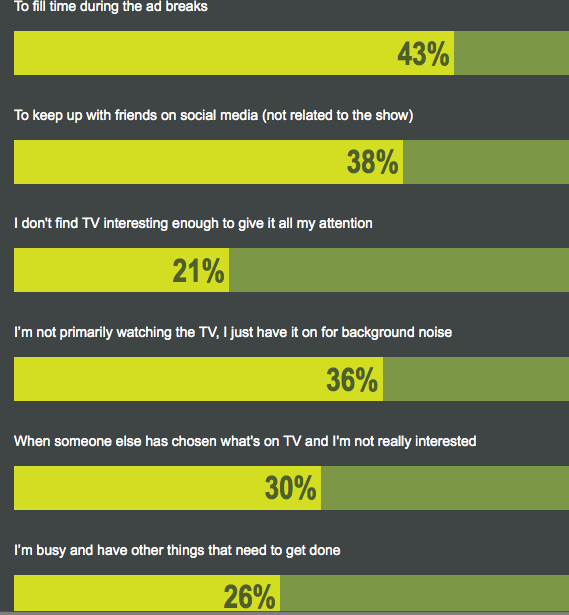
The other 30 percent are exploring related content or taking some action tied to the content or advertising on TV (“meshing”).
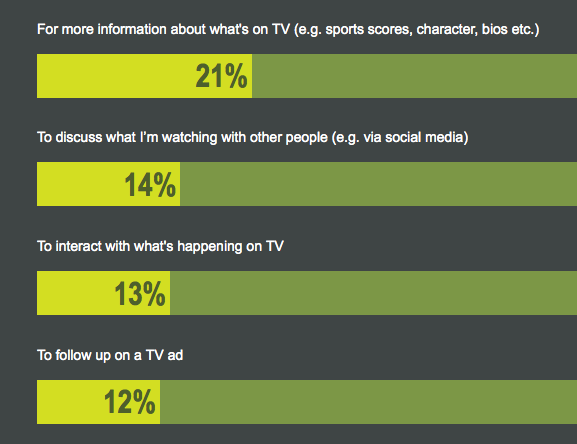
Television is becoming just one more feed inside our smartphone.
The data above is for the US market. The situation facing the original “first screen” is even more dire in China, where the smartphone extracts far more total time than the television.
Chinese smartphone owners spend nearly eight hours looking at electronic screens each day, the third longest in the world, with smartphones and laptops dominating their “screen time,”
Smartphones (170 minutes per day) and laptops (161 minutes per day) dominate their “screen time,” while TV holds their attention for only 89 minutes per day.
Death To The First Screen
Why enter a market that is becoming less relevant in our lives? Why risk detracting from iPhone usage?
A Kleiner Perkins Caufield and Byers study last year found the average user checks their smartphone 150 times a day. This number is higher still for the average iPhone user, as various metrics consistently show iPhone users spend more time on their device, more time on the mobile web, more time with apps.
Of course, it’s not just about how much time we all look at our smartphone screens but how we use them.
For a growing number of us in the US, China and every where else, the smartphone is simply more entertaining, more engaging, more attention-grabbing than anything and everything available to us on TV. Seen in this light, why would Tim Cook and Apple even consider such a product?
The derisively labeled “second screen” has become our first screen, and as with banks, that’s where the money is. Even the most aggressive analysis of the Apple Television’s potential suggest limited upside to the company’s value.
Perhaps Apple is working on a complete re-construction of the very idea of “television,” in which case my analysis is wrong. Or perhaps once Apple has sold as many iPhones as possible, then it might make sense to tackle the television market. If I were Tim Cook, I would take a pass, at least for now. What are your thoughts?
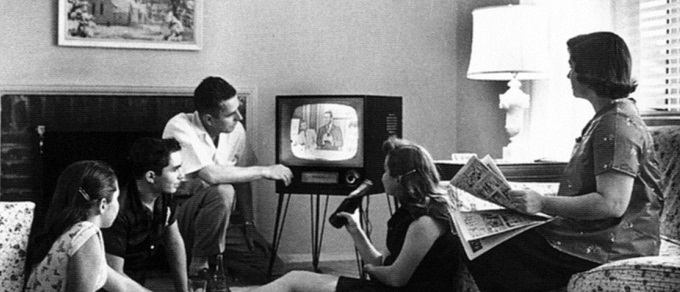
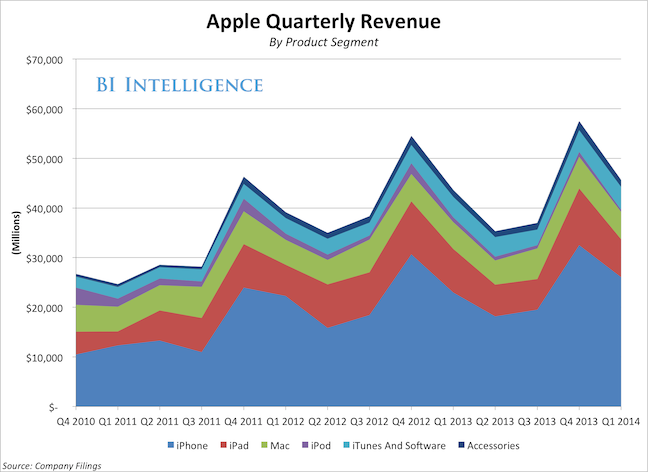
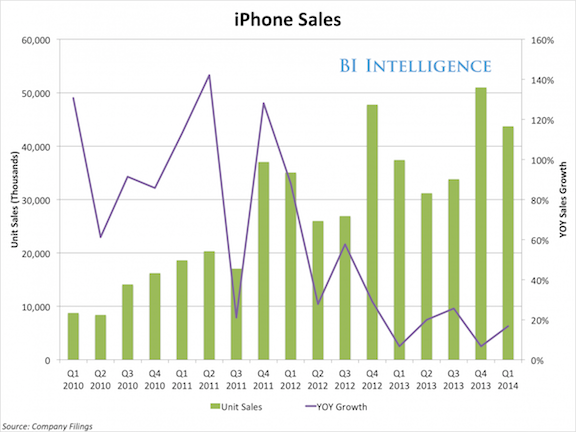


“Why enter a market that is becoming less relevant in our lives? Why risk detracting from iPhone usage?”
I think the first question is more relevant than the second, but I guess it depends on where one lives. My brother is working in Korea right now and he tells me everyone walks around watching TV on their phones. Not sure how much of an impact a TV at home would have on that.
I am also not sure how an Apple TV would change the role of TV and an iPhone’s relationship to that, based on your responses above. But then I guess that depends on the final form an Apple TV would take. If it doesn’t offer the additional engagement activities, it really isn’t different, then, is it? Nothing disruptive about that.
Not to go down the WWSJD road, but I also think Apple never went deeper (without really knowing what Jobs meant with his oft quoted comment on TV) because Jobs never had the love for TV he had for music. There was also greater opportunity to affect music. With music there are three delivery systems—live, recording, radio. With TV there was only the TV. There is a major difference there that I won’t delve into. It makes TV harder for someone to offer a disruptive force even as customers clamor for it. Even though cable offers on demand movies, on demand TV is a way of thinking the TV industry is just not used to until recently.
Joe
Thanks. I’ve long just *assumed* Apple would make a television. The worst that would happen is that tv sets would make a small profit and iTunes rentals would only go up a small amount. But as I looked at iPhone engagement studies, I realized we have it all wrong. There’s a potential for an Apple television to limit iPhone engagement. And if that happens, it limits iPhone’s appeal. That makes a television a risky gamble, in my view.
One of the things Apple does right is to cannibalize themselves. That’s why iTunes was so strongly protected in the beginning. Lock-in is a vital tool for them to be able to do so.
That seems like the obvious push behind any Apple Television. Even if it’s overall just a small profit to Apple, it boosts the ecosystem and helps with lock-in.
Caveat emptor!